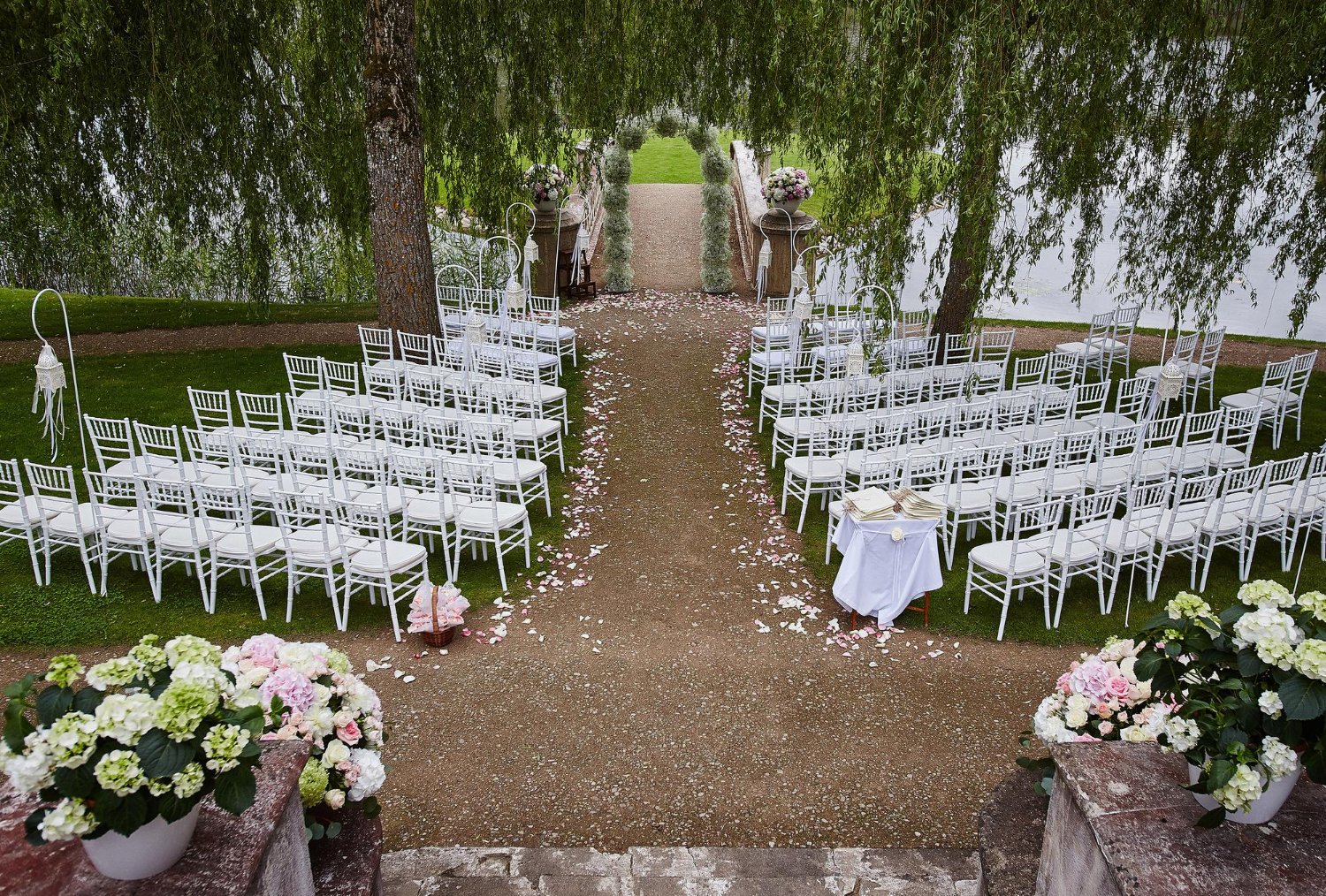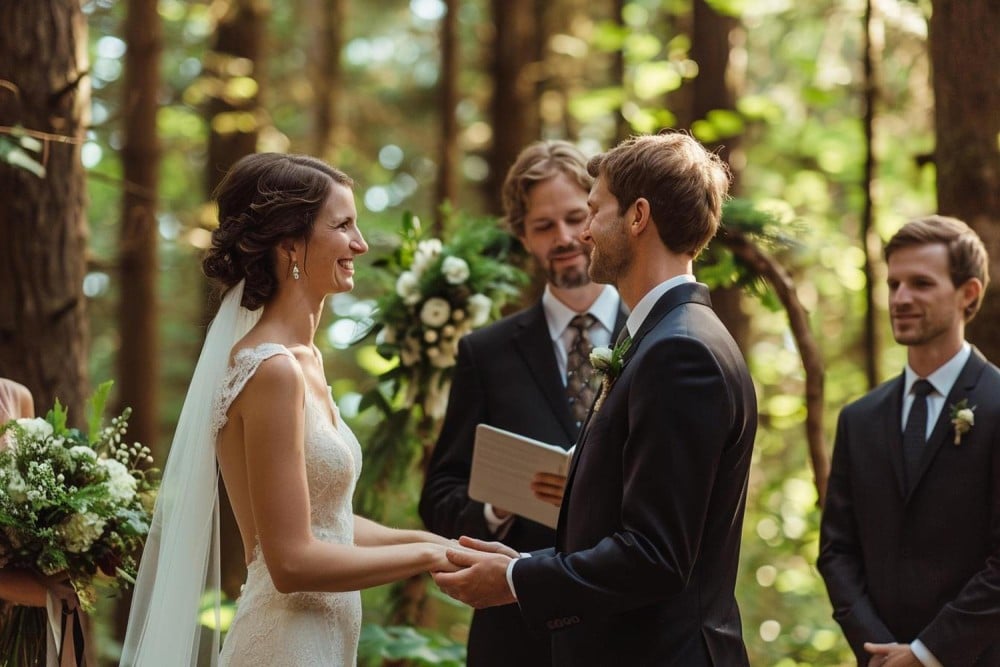Key Takeaways:
- Setting a budget and creating a guest list are essential steps when planning a wedding. These choices will impact the choice of venue and other wedding-related costs.
- Several factors must be considered when deciding how many people to invite to a wedding, including the average number of guests, RSVP collection, children and plus-ones, budget, and venue capacity.
- Finalizing the guest list involves prioritizing important guests, setting boundaries, and customizing the list to the budget and venue. It may also involve weighing pros and cons of guest list length, considering guests from each side, and adjusting the average number of guests to suit needs.

Importance of Budget and Guest List
Did you know that your budget and guest list can significantly impact your choice of wedding venue? In this section, we'll explore the importance of budget and guest list when planning your big day. We'll cover the impact of your guest list on your budget and venue selection, as well as the importance of determining your budget and guest list before choosing a venue. Get ready to make informed decisions for a wedding day that is both unforgettable and manageable!
Determining Budget and Guest List Before Venue Selection
When planning for a wedding, it is essential to determine the appropriate budget and create a guest list before selecting a venue. These factors play a significant role in the planning process and can impact the selection of a venue that can accommodate all guests and provide necessary services without exceeding one's budget.
It is recommended to determine your planned budget and create a comprehensive guest list before selecting the venue. The guest list can have an impact on both the chosen budget and the venue selected. Considering attendance rates, RSVP collection tips, plus-ones, evaluating budget and capacity per venue, and family contributions to the overall budget are several factors to consider when deciding how many people to invite.
The finalization of the guest list can be challenging, but prioritizing important guests and setting boundaries by asking seven questions can make this task manageable. To customize the guest list based on your budget and chosen venue, you must weigh the pros and cons of varying guest numbers and evaluate factors such as catering for each guest or if there'll be children or families attending from each side. Also, consider how spending affects venues and other aspects such as catering costs.
Unique details that one should keep in mind when choosing who to include in your guest count criteria include balancing finances with personal connections while considering important traditions. It's crucial not to exceed your expected number of guests for practical reasons such as finding seating spaces at dinner tables or providing accommodations.
Pro Tip: Create initial cost estimates and ask vendors about what influences pricing changes. One can get detailed insight on how much they need to invest in accommodation arrangements and food-related amenities like buffets or personalized menus specifically catered to their guests' needs/preferences.

Impact of Guest List on Budget and Venue Choice
When planning a wedding, one of the most critical decisions to make is the guest list. The impact of the guest list on budget and venue choice cannot be overstated. Every additional guest added to the list will increase overall costs, including expenses such as venue rental, catering, and other necessities. Wedding venues, in particular, often charge more for larger events, so the size of the guest list directly affects the budget.
Larger guest lists also require more food, beverages, seating arrangements, and potentially a bigger venue. For those on a tighter budget, smaller weddings may allow for greater customization and nicer amenities while maintaining affordability. A smaller guest list can also provide the opportunity for more intimate connections with family and friends.
When deciding on the guest list, it is important to determine who is most important to share the special occasion with, as this can lead to unique details in the planning process. Prioritizing guests will also help make informed decisions and gain maximum efficiency, preventing overcrowding or an uncomfortably empty space.
In conclusion, the guest list plays a significant role in wedding planning, like playing Jenga. Every removal or addition has a considerable impact on the whole structure of the wedding budget and venue. Careful consideration of the guest list can help create everlasting memories while also managing costs and venue choices.
Factors to Consider When Deciding How Many People to Invite
When it comes to weddings, one of the trickiest decisions is deciding how many people to invite. In this section, we'll explore various factors that come into play when making this decision, including:
- Average guest numbers and the popularity of smaller weddings
- Attendance rates
- Determining guests with plus-ones and children
- Evaluating budget and venue capacity
- Family contributions to the budget
Let's dive in and figure out the best approach for your special day!
Average Number of Guests and Popularity of Smaller Weddings
The size of your wedding guest list is a crucial aspect to consider when planning your special day. Couples often face the challenge of determining how many guests to invite, given various factors like the average number of guests and the popularity of smaller weddings.
To get a better understanding of this, we can look at a table that highlights some key factors related to wedding size. As shown in the table below, weddings with a guest count of 50 or less are becoming increasingly popular, while those with over 200 guests are decreasing in popularity. However, traditional weddings with a guest count between 125-150 remain popular.
| Number of Guests | Popularity |
|---|
| 50 or less | Increasing |
| 75-100 | Growing |
| 125-150 | Traditional |
| 200+ | Decreasing |
It's important to remember that these numbers only represent current trends and not what's right or wrong. When making a decision on how many guests to invite, factors such as budget, venue capacity, and personal preferences should take priority.
Nonetheless, keep in mind that trying to collect RSVPs can be like herding cats, but with more emotional investment. So, consider all factors carefully before making your guest list.
Attendance Rates and RSVP Collection Tips
When planning a wedding, it's important to consider attendance rates and strategies for RSVP collection. There are various factors that can impact guests' attendance, such as location, timing, distance, and personal circumstances.
To improve RSVP collection, couples can:
- set an early deadline
- send reminders
- provide multiple response options such as email or online forms
- use online tools for managing guest lists and RSVPs.
Clear instructions should be included on the invitation card, along with contact information for any questions or concerns. In case of low response rates, couples may need to follow up individually with guests to confirm their attendance status. It's also wise to plan for some extra buffer guests, as last-minute cancellations or unexpected attendees may cause inconvenience.
When deciding on a guest count, it's essential to factor in all possible variables that could impact attendance rates. Additional strategies may include:
- evaluating alternative ways of gathering replies, such as social media platforms or text message confirmations
- considering cultural traditions
- analyzing previous family weddings
- following up with non-responsive guests through personal phone calls if necessary.
By taking these steps, couples can maximize attendance while ensuring the budget and venue capacity allow for comfortable accommodation of all guests.
Deciding on Children and Plus-Ones
Before finalizing the guest list, couples must consider whether or not to include children and plus-ones. Making a decision on these details can have a significant impact on their budget and choice of venue.
Regarding children, some couples may choose to limit their presence at the wedding, while others may welcome them with open arms. It is essential to consider the number of children on both sides of the family and any other guests who plan to bring their kids. It may be helpful to hire a babysitter or set up a designated kids' area to make parents feel more comfortable attending the wedding.
Furthermore, it can be challenging to decide whether or not to offer plus-ones. Couples may want to invite guests with significant others they have not met before, or include coworkers who were not initially invited. However, adding more guests means additional expenses and the potential of compromising on venue capacity. It is suggested that couples prioritize inviting those in committed relationships or those who share close friendships with both parties.
Overall, it is crucial to evaluate the inclusion of children and plus-ones to help alleviate stress and save money in the long run.
Evaluating Budget and Venue Capacity for Guest Count
To ensure that the wedding guest count does not exceed budget and venue capacity, evaluating budget and venue capacity for guest count is crucial. Before finalizing the guest list, it is important to create a table that compares the estimated budget and venue capacity with the number of guests. This table can include columns for estimated cost per person, total estimated cost, maximum capacity of the chosen venue, estimated number attending from each side of the family, and maximum number of guests allowed. By doing so, a clear picture of how many guests can be accommodated within budget and venue limitations can be obtained.
It is important to note that family contributions to the budget may impact the guest count. If certain family members are contributing a significant amount, they may expect to have more input on the guest list. In such cases, open communication with all parties involved is essential, and compromises that work for everyone should be discussed.
Overall, evaluating the budget and venue capacity for guest count is an essential step in ensuring the success of a wedding celebration within budget and logistical constraints. By using a comparative table and taking into account any family contributions, a final guest list can be generated that fits within both financial and logistical limitations.
Family Contributions to the Budget
When planning a wedding, families play an essential role, especially in terms of budgeting. Family contributions can significantly impact the budget and ultimately the guest list. Therefore, it is essential to approach the subject with open communication.
It is worth appreciating that family contributions can help increase the total budget, which can be advantageous for the wedding couple's dream event. However, it is paramount to discuss the amount of the contribution when deciding on the guest list. Fair financial decisions should be made while ensuring that everyone is comfortable with the plans.
Communication is critical in handling family contributions to the budget. Couples should establish clear boundaries with family members regarding their involvement in decision-making. It is essential to let them involve themselves in decisions not related to budget planning or their involvement in key roles during events.
Lastly, it is vital to acknowledge and appreciate the contributions made by the family members, regardless of them covering all the expenses towards the event. It is essential to work together as a family and prevent misunderstandings early on to have clear expectations.
In conclusion, managing family contributions towards the budget may entail tough decisions and awkward conversations that the wedding couple must be ready to face. Nonetheless, open communication, clear expectations, and respect for boundaries will help create a memorable and enjoyable wedding for all parties involved.
Finalizing the Guest List
Finalizing the guest list for your wedding can be one of the most challenging tasks to do, but don't worry, we've got you covered. Discover the ultimate guide to crafting your guest list with our sub-sections on Seven Questions to Help Finalize Guest List and Prioritizing Important Guests and Setting Boundaries. Get ready to streamline your list, reduce costs, and have a perfect wedding day!
Seven Questions to Help Finalize Guest List
When finalizing the guest list for a wedding, it is crucial to consider several questions that will impact the overall budget and venue selection. These seven questions will help streamline the process and ensure an efficient outcome.
- First and foremost, it's important to identify the must-invite guests. These are the individuals whose attendance is non-negotiable. On the other hand, it's also essential to determine if there are any individuals who can be removed from the list without causing conflict.
- Another important factor to consider is the estimated amount of out-of-town guests attending. This information is crucial for budgeting purposes and will impact the venue selection.
- Furthermore, it's essential to ensure that all family members have provided their input on the guest list. This will help avoid any last-minute surprises or disagreements.
- When it comes to the number of plus-ones required, this should be determined in advance. Similarly, it's necessary to decide whether children are invited or it will be an adults-only event. These factors will impact the total guest count and ultimately affect budgeting and venue decisions.
- When deciding on a suitable number of wedding attendees, certain additional details need considering. For instance, evaluative factors such as venue capacity versus maximum amount of guests allowed need assessing. Besides this, reviewing budget determines whether respondents might deliver family contributions financially could positively influence decision-making.
- For added flexibility, it may be beneficial to consider sending out save-the-dates. This will allow for an approximate headcount before finalizing the guest list officially. This ensures accommodating potential changes while maintaining an accurate record throughout your planning process.
Prioritizing Important Guests and Setting Boundaries
Prioritizing important guests and setting boundaries is crucial when planning a wedding. It is essential to consider various factors, including the guests' relationship with you, their contribution to the big day, and how long it has been since you have seen them. Once you have a clear vision of who must attend your wedding, formalize the list by giving priority to your immediate family and close friends.
It is crucial to maintain a boundary on the number of invitations to avoid exceeding your budget and avoid any unpleasant situations by considering everyone equally instead of playing favorites.
Suppose someone from the couple's family wants an extra family member to attend, in that case, they should be willing to pay for the additional cost, including travel and accommodation expenses. Ultimately, it is your day, and you should prioritize the most significant people in your life who will cherish this moment with you.
It is imperative not to overextend yourself financially when setting up such an event. Since you cannot invite everyone who may want to attend, a helpful strategy is using an A-list/B-list approach. Some guests receive save-the-date cards while others receive invitations, depending on whether any RSVP declines bounce back from the early recipients. It is essential to define clear limits before starting each list to be fair and sensitive during this process.

Customizing the Guest List to Accommodate Budget and Venue
When it comes to creating a wedding guest list, there are many factors to consider. In this section, we'll explore how to customize the guest list to accommodate both your budget and venue limitations. We'll weigh the pros and cons of different guest list lengths and delve into factors like your budget, venue capacity, and catering considerations that impact your final decision. Join us as we examine all the necessary factors needed to adjust and create an ideal guest list that suits your needs and constraints.
Weighing Pros and Cons of Guest List Length
When planning a wedding, the guest list is a crucial factor that can determine the success of the event. Understanding how to weigh the pros and cons of guest list length is essential to ensure that the couple has their desired number of guests while also staying within budget limits.
On the one hand, having a smaller guest list has several benefits. For instance, it allows for more intimacy between guests and creates opportunities for socializing with everyone, which helps create lasting memories. Additionally, a smaller guest list allows the couple to allocate more money per person, which can lead to highly personalized gifts.
On the other hand, having a smaller guest list has some downsides, such as reduced attendance that can affect the overall energy level of the event. Moreover, excluding certain people from the guest list may cause negative feelings about exclusion.
Balancing these factors requires prioritizing what will make the couple most happy and prioritizing close friends and family members to attend. It is also important to consider factors such as venue restrictions/capacity and budget limitations when determining the number of guests to invite. Communication also plays a vital role in creating a final guest list by asking for RSVPs from potential guests as soon as possible. This way, the couple can manage their budget while keeping the number of invited guests within their desired range.
Although some couples might have financial support from family members, this should not be expected since every family has different priorities or budgets when contributing. Thus, it is important to prioritize closer-to-home affordability by avoiding over-invitation so that other desired aspects do not compromise. Overall, weighing the pros and cons of guest list length is a crucial step in creating a successful and memorable wedding.
Factors to Consider: Budget, Venue, and Guests from Each Side
When deciding whom to invite to your wedding, there are several factors to consider. The budget, venue, and guest count from both sides of the family all play a vital role in this decision-making process.
First, it is crucial to evaluate the budget set for the wedding and how much can be allocated to guests. Secondly, think about the type of venue desired and whether it can accommodate the number of guests wished to be invited.
Moreover, taking into account the guest count from both sides of the family and friends will help estimate a realistic number of expected attendees. However, keep in mind that certain guests may not be able to attend due to various reasons, which may result in needless expenses if extra guests are added to the list. Lastly, consider adjusting the number range according to specific needs while keeping all foregoing factors in mind.
It is essential to take all these aspects into account while finalizing the guest list for the wedding ceremony, so that neither the budget nor any other constraint becomes an issue later on. It is also important to set boundaries early on to avoid misunderstandings later during the planning phase. Smaller weddings are becoming increasingly popular among couples due to the lower costs and more intimate experiences they can provide.
According to WeddingWire's 2019 newlywed report, "the average wedding had 131 guests." So, get ready to make the tough decision of whom to invite, as your spending will inevitably determine the ultimate wedding venue and catering experience.
Influence of Spending on Venue, Catering, and Other Factors
When it comes to planning a wedding, the amount of money spent on venues, catering, and other factors can have a significant influence on the final guest list. Determining how many people to invite is a decision that is heavily connected to both budget allocation and venue capacity. In order to fully understand how spending impacts the guest list, it is important to carefully weigh the advantages and disadvantages of various options.
To help with this decision-making process, there are several factors that must be taken into consideration, as outlined in the table below:
| Factors | Explanation |
|---|
| Budget constraints | This can greatly impact venue choice, catering menu, and the overall experience you want to create. |
| Venue capacity | The size and layout of the venue can limit or increase the number of guests that you can accommodate. |
| Guests' preferences | Travel restrictions, accommodation availability, and other deciding factors can directly impact who makes it onto the final guest list. |
| Catering requirements | More attendees means providing larger quantities of food and drink, which can greatly increase expenses. |
It is essential to evaluate all of these factors carefully and create a customized guest list that is specific to your individual needs. In addition, family contributions can help to allocate additional budget for guests, making it possible to invite more people without sacrificing the experience you want to create.
Venue Capacity and Maximum Amount of Guests Allowed
When deciding on the final guest list for a wedding, it's crucial to take into account the venue capacity and maximum amount of guests allowed. It's important to determine the number of guests a particular venue can accommodate. To make this decision, one can create a table with appropriate columns to weigh the pros and cons of different aspects, such as guest list length, budget, venue availability, and guests from each side.
Factors like catering expenses, decor costs, parking space availability, size of the dance floor, and dress code requirements can also impact the suitability of a location. Therefore, it's recommended to compare different quotes from vendors before making a decision.
It's important to note that some venues may have restrictions on the maximum or minimum number of guests they can accept, which should be taken into account while creating the table to make an informed choice.
Although family contributions to the wedding budget may affect certain aspects, such as catering or decor expenses, it cannot be used as an excuse for inviting more people than the ceremony space can handle. Thus, tailoring the guest list to your needs is like putting on a custom-fit suit – it may take some alterations, but it's worth it for that perfect fit.
Adjusting Average Number of Guests to Suit Needs
Adjusting the average number of wedding guests to suit needs can be a challenging task that requires careful assessment of various factors, including budget, venue capacity, family contributions to the budget, and other aspects that affect guest count. To make this process more manageable, here is a comprehensive 6-step guide to help you adjust your guest list:
- Start by setting up clear boundaries for your guest list. Determine who should and should not be on the list. Discuss this with your partner, close friends, and relatives.
- Consider how many guests your chosen ceremony and reception venues can accommodate. Review the venue capacity and ensure that it is suitable for the number of guests on your list.
- Evaluate how much money you have set aside for catering. The cost-effectiveness of meals depends on the number of guests attending.
- Think about inclusive ways to reduce costs. You may opt for eliminating children or accepting only necessary plus-ones to save money.
- Prioritize important guests according to closeness. This way, you won't cut anyone out whom you want there while still keeping your total numbers under control.
- Consider using RSVP tracking tools or personnel so you can follow up with invitees if they don't respond. This will help avoid unnecessarily increasing (or decreasing) your numbers before finalizing your guest list.
In addition to adjusting average guest numbers in line with various needs like budget and venue selection, other unique elements impact RSVPs' return rate. These include factors such as timing invitations with significant life events like holidays or vacation time when people might be more likely able to attend weddings than during busy stretches when attendance could be reduced.
Pro Tip: When inviting a significantly higher number of guests than you would prefer, including in-the-trenches selected invited participants in key details could make up for the lack of intimacy and ambiance that drives smaller celebrations. It is vital to customize your guest list actively, so it suits various needs in line with budget and venue capacity requirements.
Conclusion
When planning a wedding, deciding on the guest list is a critical step that requires careful thought and consideration. The budget, venue capacity, and level of formality are essential factors that determine the required number of guests. The couple's preferences and their families' opinions should also be taken into account.
It is important to remember that the number of guests affects other aspects of the wedding, such as catering expenses, seating arrangements, and venue size. Therefore, creating a reasonable guest list is essential. A smaller guest list can help the couple reduce costs and create a more intimate and customized wedding experience.
The wedding budget is a significant consideration in determining the number of guests to invite. Couples should prioritize and allocate funds to elements that matter the most. Inviting too many guests beyond the budget can result in compromising significant aspects of the wedding. Therefore, it is crucial to limit the guest list based on the available budget.
A couple in New York City shares their experience of inviting more than 300 guests to their wedding but quickly realizing that number was too high for their budget and the venue's capacity. They eventually trimmed the list to 200, resulting in considerable savings and a better experience for their guests. The couple learned that considering multiple factors before finalizing the guest list is crucial for a successful wedding.
Five Facts About How Many People to Invite to a Wedding:
- ✅ The average number of guests for a wedding is around 130-150. (Source: Woman Getting Married)
- ✅ Smaller weddings with 50 or fewer guests are also popular. (Source: Woman Getting Married)
- ✅ Expect 75%-80% of guests to attend, plan for 100%. (Source: Woman Getting Married)
- ✅ Couples should prioritize the people they are close to, not just invite out of obligation. (Source: Brides)
- ✅ Finalizing the guest list should consider budget, venue size, and communicating with family. (Source: Paperless Post)
FAQs about How Many People To Invite To Wedding ?
How many people should I invite to my wedding?
The average number of guests for a wedding is around 130-150, but it ultimately depends on your budget and venue capacity. You can also opt for smaller weddings with 50 or fewer guests or a supersized guest list for a mega wedding.
How do I decide how many people to invite?
Start by determining your budget and guest list. The wedding budget is the biggest determining factor in how many guests can be invited. Evaluating the budget and venue prices will help determine guest capacity. Seven questions are also provided by wedding planners to help decide who makes the final cut for the guest list.
Can a wedding planner help me with creating the guest list?
Yes, a wedding planner can assist in creating the guest list based on your preferences and budget. They can also provide tips and hacks to help determine the ideal number of guests.
Do I have to invite everyone I want to my wedding?
No, creating a guest list for a wedding should prioritize the people the couple loves and are close to, and who will be excited to celebrate with them. The guest list should not be based on obligations, such as inviting distant relatives or coworkers.
What if I want to elope or have a micro wedding?
If you want to elope or have a micro wedding, you only need to invite your closest friends and family. The pros of an elopement guest list include more intimacy, personalization, and affordability.
What should I do if my parents are contributing financially to the wedding and want to invite more people?
It's important to communicate with family members about the guest list and set boundaries if necessary. You can also create a document titled "Must-Have Guests" and "Nice-to-Have Guests" to prioritize the guest list based on your preferences and budget.
 How to become a wedding officiant in tennessee ?Read more
How to become a wedding officiant in tennessee ?Read more How to bustle a tulle wedding dress ?05/21/2024Posted in: Wedding Fashion & StyleRead more
How to bustle a tulle wedding dress ?05/21/2024Posted in: Wedding Fashion & StyleRead more Planning Your Honeymoon Tips for an Unforgettable Trip05/20/2024Posted in: Wedding PreparationsRead more
Planning Your Honeymoon Tips for an Unforgettable Trip05/20/2024Posted in: Wedding PreparationsRead more The Dos and Donts of Wedding Guest Etiquette05/16/2024Posted in: Wedding Traditions & EtiquetteRead more
The Dos and Donts of Wedding Guest Etiquette05/16/2024Posted in: Wedding Traditions & EtiquetteRead more The Importance of PreWedding Counseling What You Should Know05/13/2024Posted in: Wedding PreparationsRead more
The Importance of PreWedding Counseling What You Should Know05/13/2024Posted in: Wedding PreparationsRead more Can I wear beige to a wedding ?11/14/2023Posted in: Wedding Fashion & StyleOne of the most common questions when it comes to wedding guest attire is whether it's appropriate to wear beige to a...Read more
Can I wear beige to a wedding ?11/14/2023Posted in: Wedding Fashion & StyleOne of the most common questions when it comes to wedding guest attire is whether it's appropriate to wear beige to a...Read more Do Jehovah Witnesses celebrate weddings ?02/29/2024Posted in: Wedding Traditions & EtiquetteJehovah’s Witnesses are known for their distinctive beliefs and practices, but what about weddings? In this...Read more
Do Jehovah Witnesses celebrate weddings ?02/29/2024Posted in: Wedding Traditions & EtiquetteJehovah’s Witnesses are known for their distinctive beliefs and practices, but what about weddings? In this...Read more What color shoes with navy dress for Wedding ?08/20/2023Posted in: Wedding Fashion & StyleMatching shoe color with navy dress When teaming shoe color with a navy dress, it's essential to decide on a hue...Read more
What color shoes with navy dress for Wedding ?08/20/2023Posted in: Wedding Fashion & StyleMatching shoe color with navy dress When teaming shoe color with a navy dress, it's essential to decide on a hue...Read more What to wear to a Church Wedding ?09/04/2023Posted in: Wedding Fashion & StyleAre you attending a church wedding and unsure about the dress code? Our latest article provides a deep dive into the...Read more
What to wear to a Church Wedding ?09/04/2023Posted in: Wedding Fashion & StyleAre you attending a church wedding and unsure about the dress code? Our latest article provides a deep dive into the...Read more What does a black wedding ring mean ?06/12/2023Posted in: Miscellaneous Wedding AspectsWedding rings are a traditional symbol of love and commitment, but their style and design can vary greatly. In recent...Read more
What does a black wedding ring mean ?06/12/2023Posted in: Miscellaneous Wedding AspectsWedding rings are a traditional symbol of love and commitment, but their style and design can vary greatly. In recent...Read more How to become a wedding officiant in tennessee ?06/27/2024Looking to become a wedding officiant in Tennessee but not sure where to start? This comprehensive guide will walk...Read more
How to become a wedding officiant in tennessee ?06/27/2024Looking to become a wedding officiant in Tennessee but not sure where to start? This comprehensive guide will walk...Read more How to bustle a tulle wedding dress ?05/21/2024Posted in: Wedding Fashion & StyleAre you a bride-to-be with a tulle wedding dress and wondering how to bustle it for the big day? Look no further!...Read more
How to bustle a tulle wedding dress ?05/21/2024Posted in: Wedding Fashion & StyleAre you a bride-to-be with a tulle wedding dress and wondering how to bustle it for the big day? Look no further!...Read more Planning Your Honeymoon Tips for an Unforgettable Trip05/20/2024Posted in: Wedding PreparationsPlanning your honeymoon is an exciting and important step in beginning your life together as a married couple. From...Read more
Planning Your Honeymoon Tips for an Unforgettable Trip05/20/2024Posted in: Wedding PreparationsPlanning your honeymoon is an exciting and important step in beginning your life together as a married couple. From...Read more The Dos and Donts of Wedding Guest Etiquette05/16/2024Posted in: Wedding Traditions & EtiquettePlanning to attend a wedding soon? Make sure you brush up on your wedding guest etiquette to ensure you have a great...Read more
The Dos and Donts of Wedding Guest Etiquette05/16/2024Posted in: Wedding Traditions & EtiquettePlanning to attend a wedding soon? Make sure you brush up on your wedding guest etiquette to ensure you have a great...Read more The Importance of PreWedding Counseling What You Should Know05/13/2024Posted in: Wedding PreparationsAre you and your partner considering pre-marriage counseling but not sure what to expect? This article is here to...Read more
The Importance of PreWedding Counseling What You Should Know05/13/2024Posted in: Wedding PreparationsAre you and your partner considering pre-marriage counseling but not sure what to expect? This article is here to...Read more


















Top authors